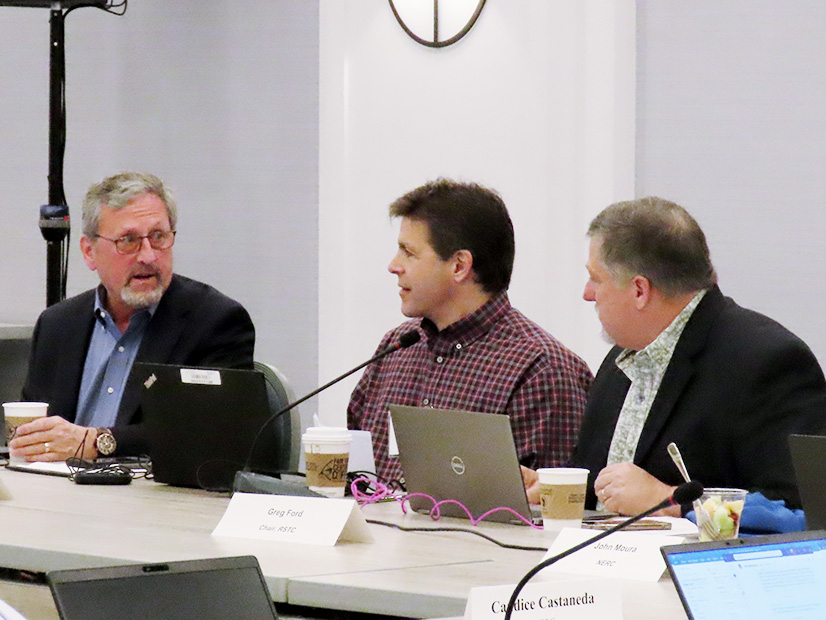CLEARWATER BEACH, Fla. — As this week’s meeting of NERC’s Reliability and Security Technical Committee (RSTC) wrapped up in Florida, Vice Chair Rich Hydzik invoked the movie “Moneyball” to explain his committee’s place in the “data-driven world” of electric reliability.
“There’s a scene in that movie where [baseball manager] Billy Beane wants to draft somebody the scouts have never heard of, and they … have another pick they want. He says the numbers don’t back that up, and their answer is that he has the intangibles; you can’t measure the intangibles,” Hydzik said. “I think this meeting kind of highlights the intangibles that complement that data-driven approach to things we do.”
This week’s two-day meeting is the only fully in-person gathering planned for the committee this year. (See “Future Meetings,” NERC RSTC Briefs: Dec. 6-7, 2022.) For the June meeting at the MRO offices and the September meeting at WECC’s office, leadership intends for only members to attend in person while observers participate online. The final meeting of the year in December will be entirely virtual.
Standards Projects Move Forward Despite Data Concerns
NERC’s System Planning Impacts from Distributed Energy Resources Working Group (SPIDERWG) brought two Standard Authorization Requests (SARs) to the committee for endorsement, one of two standards actions the committee took this week.
The SARs are intended to modify existing reliability standards FAC-001-4 (Facility interconnection requirements) and FAC-002-4 (Facility interconnection studies) to require more consideration of potential reliability impacts from distributed energy resources (DER) before they are integrated to the electric grid. (See p. 129+ of agenda for SARs.)
This was the SARs’ second time before the RSTC; SPIDERWG Chair Shayan Rizvi brought them to the committee in December as well, though at that point the group was only seeking comment from committee members.
At Wednesday’s session, Nate Schweighart of the Tennessee Valley Authority expressed concern that the SAR was “getting a little bit ahead of the data,” citing the lack of centralized information sources on DERs, and of agreed-upon channels for accessing the information.
“You guys are putting requirements on the DPs [distribution providers] to provide the data, but there’s a large number of DPs; how we coordinate the information between the DPs to aggregate the DER information in order to properly study it, I think that all has to be figured out,” Schweighart said. “And then to require those things to happen before we have the data, I think, will cause some chaos amongst the transmission planners to figure out how to do it.”

John Moura, NERC’s director of reliability assessment and performance analysis, pointed out that “there’s a lot of things we have to study that we don’t have the data for.” He suggested that the presence of a mandatory standard could provide an impetus for DPs and other stakeholders to build the communication infrastructure needed to share the information efficiently.
David Grubbs from the municipal electric utility in Garland, Texas — who described himself as representing “both the DPs and the TPs [transmission planners] in our organization” — supported the SARs, saying the measures are “probably several years overdue.”
However, he also warned that he didn’t “think the data exists right now.” He suggested that the standard drafting team (SDT) to which the SARs are eventually assigned be encouraged to give utilities “a year or two” to collect the data.
“It’s going to take a while for the DPs to get data that is meaningful, and even after you get the data to put it in the model, and [make] sure the model solves and … do some testing to make sure that represents the real world,” Grubbs said. “So, I agree it needs to be done, I just think that … in our implementation plan, [we need to] make sure that we give adequate time to get verifiable data out of the distribution providers.”
Calling for a vote on the SARs, Chair Greg Ford said the issue came down to “timing of data versus studies,” and said he was confident the committee could work with the SDT and others involved in the process “to make sure that timing is there.” Members voted unanimously to endorse the SARs; they will now move to the Standards Committee, which will decide whether to approve them and assign a SAR drafting team.
Also before the committee this week was a SAR to modify MOD-031-3 (Demand and energy data). The measure, which was also brought by the SPIDERWG, would allow planning coordinators (PC) to “obtain existing and forecasted DER information from DPs or TPs” to ensure that the data “is available to the parties that perform reliability studies and assessments.”
Unlike the earlier SARs, SPIDERWG was only seeking reviewers from the RSTC, so no vote was needed. Secretary Stephen Crutchfield promised to email the draft SAR to the committee so that any interested members could volunteer.
Guidelines Approved
The RSTC also approved several reliability guidelines at this week’s meeting. Although these are not binding, their adoption is “highly encouraged” by NERC.
The first guideline, “Electromagnetic Transient [EMT] Modeling for BPS-Connected Inverter-Based Resources,” was submitted by the Inverter-based Resources Performance Subcommittee (IRPS). Designed as a reference for TPs and PCs that are performing EMT studies during the interconnection study process, the guideline is intended to “serve as a foundation for future EMT modeling related activities of IRPS.”
Next was a guideline intended to inform utilities on the Institute of Electrical and Electronics Engineers’ (IEEE) Standard 1547-2018, which relates to the interconnection and operation of DER. Although the IEEE standard only involves resources that are connected to the distribution system — and therefore not subject to NERC jurisdiction — SPIDERWG felt a guideline was needed because the installation and use of DERs “require coordination between distribution and transmission entities.”
The Supply Chain Working Group brought to the RSTC a guideline on avoiding cyber supply chain security risks, while the Real Time Operating Subcommittee (RTOS) submitted guidelines on addressing cyber intrusions and on gas and electric industry coordination.




